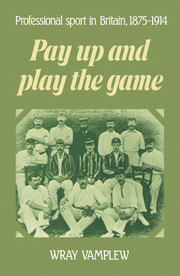Book contents
- Frontmatter
- Contents
- List of tables
- Preface
- Acknowledgements
- A guide to prices, 1870–1914
- Part I An overview
- 1 Is money the root of all evil? A historical appreciation of commercialisation in sports
- 2 Comments on the state of play: economic historians and sports history
- Part II The development of professional gate-money sport
- Part III Sport in the market place: the economics of professional sport
- Part IV Playing for pay: professional sport as an occupation
- Part V Unsporting behaviour
- Part VI A second overview
- Appendices
- Notes
- Bibliography
- Index
2 - Comments on the state of play: economic historians and sports history
Published online by Cambridge University Press: 16 February 2010
- Frontmatter
- Contents
- List of tables
- Preface
- Acknowledgements
- A guide to prices, 1870–1914
- Part I An overview
- 1 Is money the root of all evil? A historical appreciation of commercialisation in sports
- 2 Comments on the state of play: economic historians and sports history
- Part II The development of professional gate-money sport
- Part III Sport in the market place: the economics of professional sport
- Part IV Playing for pay: professional sport as an occupation
- Part V Unsporting behaviour
- Part VI A second overview
- Appendices
- Notes
- Bibliography
- Index
Summary
The late Bill Shankly, doyen of football managers, once dismissed the implicitly critical statement that ‘soccer was a matter of life and death to some people’ by commenting that in fact ‘it was much more serious than that’. So it is with sport in general: it can be fun, but it can also have significant political, social and economic consequences. So it is with sports history: studying it can be as much fun as playing sport, but it can also be just as serious. Unfortunately, historians have been slow to appreciate this. One aficionado in the early twentieth century lamented that ‘it is a surprising circumstance that the national idiosyncracy of which many of us are proudest - our love for sport - has hitherto signally failed to arouse the enthusiasm of … the historian’. Little has changed a century later when it could be commented that ‘one thing that mattered to most working men in late Victorian England was how they spent the time when they were not at work. It is a history still largely to be written’. Economic historians in particular have failed to take up their pens.
Sport has become big business: vast amounts are invested in the creation of the sports product and its economic spin-offs; sports superstars earn high incomes, as much from off-field as on-field activities; and sports consumers by the million pay at the gate to watch them play, and even more are secondhand spectators via the printed and electronic media.
- Type
- Chapter
- Information
- Pay Up and Play the GameProfessional Sport in Britain, 1875–1914, pp. 11 - 18Publisher: Cambridge University PressPrint publication year: 1988



